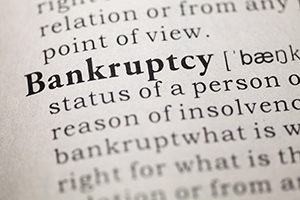Chapters of Bankruptcy – the kind you file is going to be based on your needs and qualifications.
Part of the Bankruptcy Information Sheet provided by U.S. Trustee Program explains each as follows:

Chapter 7 – A trustee is appointed to take over your property. Any property of value will be sold or turned into money to pay your creditors. You may be able to keep some personal items and possibly real estate depending on the law of the State where you live and applicable federal laws.
Chapter 13 – You can usually keep your property, but you must earn wages or have some other source of regular income and you must agree to pay part of your income to your creditors. The court must approve your repayment plan and your budget. A trustee is appointed and will collect the payments from you, pay your creditors, and make sure you live up to the terms of your repayment plan.
Chapter 12 – Like chapter 13, but it is only for family farmers and family fishermen.
Chapter 11 – This is used mostly by businesses. In chapter 11, you may continue to operate your business, but your creditors and the court must approve a plan to repay your debts. There is no trustee unless the judge decides that one is necessary; if a trustee is appointed, the trustee takes control of your business and property.
If you have already filed bankruptcy under chapter 7, you may be able to change your case to another chapter.
Your bankruptcy may be reported on your credit record for as long as ten years. It can affect your ability to receive credit in the future.
We focus on individuals and families struggling with debt, so our Lenexa Bankruptcy office office files Chapter 7 and Chapter 13 cases. The best way to determine which Chapter of Bankruptcy would best benefit you is to set up a free, no obligation bankruptcy consultation today.

